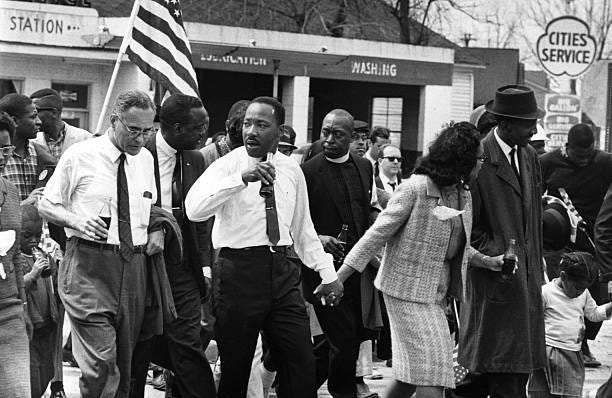Martin Luther King Jr. was murdered 57 years ago. America still needs his wisdom. | Opinion
American people of goodwill have come a long way since Dr. King's death. But we're still a work in progress.

The American project is never finished. And if our history proves anything, it’s that progress comes from unlikely places and the acts of everyday people. Places like the Edmund Pettus Bridge in Selma, Alabama − and people like those who risked their lives to walk across it 60 years ago.
The three of us will cross that same bridge this weekend, as we commemorate the anniversary of the assassination of Dr. Martin Luther King Jr. on April 4 in Memphis, Tennessee.
With the hindsight of history, Americans think of Dr. King and the civil rights activists in Selma as heroes. They were. It took heroic courage to stand for the American principles of equal rights and the dignity of all people at a time when our country so tragically failed to live up to them.
Those marchers were met with brutal violence, which our country remembers as “Bloody Sunday.” But even the most horrific violations of our country’s founding principles didn’t stop them from trying to more fully realize their promise.
In that moment when the country risked being torn apart by hate, Dr. King told Americans to love. He called it “agape love” that “begins by loving others for their sakes” and “discovers the neighbor” in every person we meet. A love that “makes no distinction between a friend and enemy.” A “love seeking to preserve and create community.”
Americans urgently need Dr. King's wisdom today
American people of goodwill have come a long way since Dr. King’s death. But we’re still a work in progress. And the insights that guided his actions are urgently needed today to address our own challenges.
Sixty years after Selma, Americans still feel what Dr. King called a “slow fire of discontent.” Resentment is soaring, with just 7% of Americans saying society is “mostly fair.” And nearly half of Americans say those who hold different political views aren’t just wrong − they’re evil.
If we can’t see the humanity in our fellow Americans, even and especially those with whom we disagree, our country’s future is grim indeed.
Separated by such widening chasms of division, Americans need to reject the hate and unite around the love that Dr. King preached. But a call to love without a path to action has little chance of succeeding.
The heroes of the Civil Rights Movement knew this. They were ordinary Americans whose extraordinary actions changed a nation. They sat at lunch counters, they walked to work rather than ride the bus and they marched across the bridge in Selma.
The everyday nature of these acts does not diminish their importance. But it does prove that it’s within the power of every person to contribute to profound change. They show that we cannot wait for someone else to solve our problems. We must be the solutions our communities and country need.
We're calling Americans to acts of service
The three of us are working to spark that action. As we approach the 250th anniversary of our country’s founding in 2026 and Dr. King’s 100th birthday in 2029, our organizations are launching a partnership alongside dozens of others to inspire people to contribute 100 million hours of service.
We aim to show that everyone can help move America forward. This isn’t merely performative volunteerism. This is about solving problems in the most proven way − by empowering every person to contribute to change from the bottom up.
This service, grounded in the love that Dr. King described, is how people discover that they matter and that we need each other. It’s hard to hate the person you’re working with to solve a problem in your community, no matter how different you are. It’s hard to be disconnected, divided and resentful when you’re contributing to help others succeed. And when people see that good things happen as a result, they want to do more of it.
Americans already want to contribute in this way. But too often, they just don’t know how.
A recent study found that a clear majority of Americans across all demographics, age and geographies say they aspire to make a difference in their communities. But only a third feel they’re making a difference. They’re looking for the chance to find a life of meaning by contributing in the lives of others. And they give us hope for a new movement to more fully apply America’s principles and realize America’s promise.
In his lifetime, Dr. King asked if Americans would choose “chaos or community?” We must answer in the affirmative today − building the community that fosters true unity.
Dr. King called this vision the “Beloved Community” − a society where people could realize their potential by helping others do the same. The more people who engage in this deeply American process, the more progress we can achieve.
That was Dr. King’s dream. It also happens to be the American dream. And all of us must do our part to realize that dream today.
Martin Luther King III is chairman and Arndrea Waters King is president of the Martin Luther King III Foundation. Brian Hooks is chairman and CEO of Stand Together.